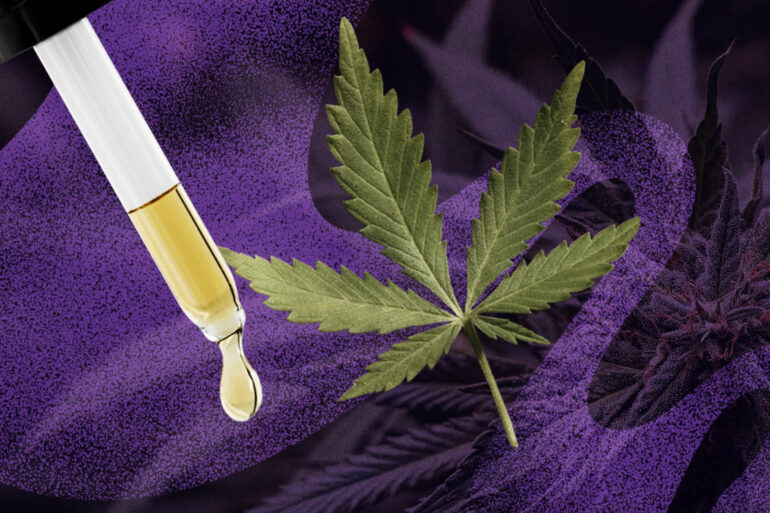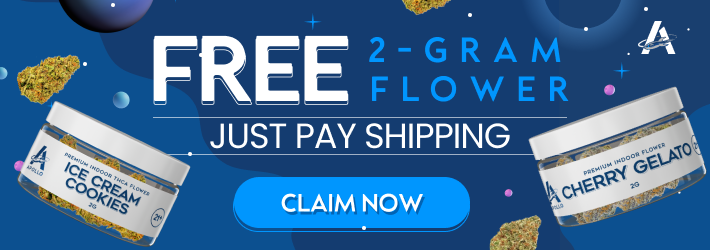Key Takeaways:
- Cannabidiol (CBD) represents some of the most compelling evidence for the therapeutic potential of medical cannabis.
- Its efficacy is notably acknowledged by the FDA with the approval of a CBD-based pharmaceutical, Epidiolex®, which is prescribed for rare childhood epilepsy syndromes.
- Research also indicates that CBD may be beneficial for a broader spectrum of health issues, such as chronic pain, inflammation, anxiety, and substance abuse disorders.
- Typically, CBD is well-received by the body, with tolerable doses reaching as high as 1,500 mg per day.
- While side effects can occur, they tend to be related to the dosage. The most prevalent adverse effects experienced by adults include gastrointestinal issues like vomiting and diarrhea, as well as drowsiness.
What Is CBD?
Cannabidiol, or CBD, is the most widely-known non-intoxicating cannabinoid in the world, but how it works is often misunderstood.
Ironically, when it was first extracted in the 1940s, CBD was thought to be inactive. As a result, the research focus shifted to psychoactive cannabinoids like THC for decades, until scientists realized that the available data at the time didn’t tell the whole story.
CBD doesn’t work like THC does, which is why they feel so different. While the exact molecular pathways are not entirely understood, we know that CBD delivers relief through a combination of mechanisms:
- Indirectly stimulating CB1 and CB2
- Increasing endocannabinoids
- Directly targeting over 65 receptors involved in pain, mood, and more
Hemp-based CBD is federally legal, and a multitude of CBD products have exploded onto the market. You can find CBD in almost any consumer product imaginable, including oils, vapes, edibles and drinks, lotions, powders, and even shampoos.
But you should know that not all products are of equal quality or efficacy, and ingredients can vary, so it’s important to only buy from reputable brands.
Medical Benefits
Many people use CBD every day for well-being, mood, and symptomatic relief for a variety of conditions.
CBD is available nationwide in retail hemp products and in one approved pharmaceutical formulation for children aged one and above with Lennox-Gastaut syndrome, Dravet syndrome, and tuberous sclerosis complex.
If you’re curious about using CBD for “off-label” purposes, you can certainly try it, but remember that manufacturers cannot make any therapeutic claims.
Nevertheless, there is credible but limited evidence that CBD has useful properties like:
- Pain-relieving
- Anti-inflammatory and antioxidant
- Anti-anxiety and antidepressant
- Neuroprotective
- Antiarthritic
- Promote healthier sleep
- Anticonvulsant
- Anticancer
- Relief of nausea and vomiting (antiemetic)
- Antipsychotic in schizophrenia, Parkison’s, ASD, ADHD, PTSD, bipolar, and more
- Reducing THC’s high and psychotropic adverse effects
Side Effects
Nothing is free of side effects, including CBD. But there’s a huge window of tolerability and it usually depends on the dose you take. The most common side effects people encounter after excess CBD consumption are:
- Gastrointestinal (GI) upset (nausea, vomiting, diarrhea)
- Sleepiness or sedation
- Upper respiratory disturbances (more often in children)
Less commonly, people taking CBD can also experience decreased appetite, sleeping problems, rashes, headaches and abdominal pain.
Liver enzymes can be increased if concurrently taking antiepileptic medications like clobazam and valproate. Your healthcare provider can monitor these drug interactions.
Will CBD Get You High?
No, good-quality CBD products will not get you high.
This is the main clinical advantage to using CBD over THC. CBD presents a more practical and safer alternative for relief during daytime, driving, and working hours.
Note that while CBD itself is non-impairing, technically a CBD product only has to have less than 0.3% THC. Most products have much less than this, but this is one of the reasons it’s important to check the certificate of analysis (COA) for any product you buy. If a product has almost 0.3% THC, and if you take enough of it, the THC could still have a noticeable effect.
This is especially important when buying CBD because the quality of hemp and derivative products varies greatly due to regulatory gaps. However, many high-quality CBD companies make “broad-spectrum” CBD products with no detectable THC.
Conclusion
CBD is the easiest cannabinoid to onboard newcomers. In my experience, the accessibility and practicality of CBD make it an essential tool for patients struggling with a wide range of conditions.
References
- Bilbao, A., & Spanagel, R. (2022). Medical cannabinoids: A pharmacology-based systematic review and meta-analysis for all relevant medical indications. BMC Medicine, 20, 259. https://doi.org/10.1186/s12916-022-02459-1
- Bonaccorso, S., Ricciardi, A., Zangani, C., Chiappini, S., & Schifano, F. (2019). Cannabidiol (CBD) use in psychiatric disorders: A systematic review. NeuroToxicology, 74, 282–298. https://doi.org/10.1016/j.neuro.2019.08.002
- Britch, S. C., Babalonis, S., & Walsh, S. L. (2021). Cannabidiol: Pharmacology and Therapeutic Targets. Psychopharmacology, 238(1), 9–28. https://doi.org/10.1007/s00213-020-05712-8
- Crippa, J. A., Guimarães, F. S., Campos, A. C., & Zuardi, A. W. (2018). Translational Investigation of the Therapeutic Potential of Cannabidiol (CBD): Toward a New Age. Frontiers in Immunology, 9, 2009. https://doi.org/10.3389/fimmu.2018.02009
- Ebbert, J. O., Scharf, E. L., & Hurt, R. T. (2018). Medical Cannabis. Mayo Clinic Proceedings, 93(12), 1842–1847. https://doi.org/10.1016/j.mayocp.2018.09.005
- Geci, M., Scialdone, M., & Tishler, J. (2023). The Dark Side of Cannabidiol: The Unanticipated Social and Clinical Implications of Synthetic Δ8-THC. Cannabis and Cannabinoid Research, 8(2), 270–282. https://doi.org/10.1089/can.2022.0126
- Khan, R., Naveed, S., Mian, N., Fida, A., Raafey, M. A., & Aedma, K. K. (2020). The therapeutic role of Cannabidiol in mental health: A systematic review. Journal of Cannabis Research, 2, 2. https://doi.org/10.1186/s42238-019-0012-y
- Madeo, G., Kapoor, A., Giorgetti, R., Busardò, F. P., & Carlier, J. (2023). Update on Cannabidiol Clinical Toxicity and Adverse Effects: A Systematic Review. Current Neuropharmacology. https://doi.org/10.2174/1570159X21666230322143401
- Organization, E., & Louis, R. (2018). CANNABIDIOL (CBD) Critical Review Report Expert Committee on Drug Dependence Fortieth Meeting. https://doi.org/10.13140/RG.2.2.13488.48640
- Pinto, J. V., Saraf, G., Frysch, C., Vigo, D., Keramatian, K., Chakrabarty, T., Lam, R. W., Kauer-Sant’Anna, M., & Yatham, L. N. (2020). Cannabidiol as a Treatment for Mood Disorders: A Systematic Review: Le cannabidiol comme traitement des troubles de l’humeur: une revue systématique. Canadian Journal of Psychiatry. Revue Canadienne de Psychiatrie, 65(4), 213–227. https://doi.org/10.1177/0706743719895195
- Ranum, R. M., Whipple, M. O., Croghan, I., Bauer, B., Toussaint, L. L., & Vincent, A. (2023). Use of Cannabidiol in the Management of Insomnia: A Systematic Review. Cannabis and Cannabinoid Research, 8(2), 213–229. https://doi.org/10.1089/can.2022.0122
- Souza, J. D. R., Pacheco, J. C., Rossi, G. N., de-Paulo, B. O., Zuardi, A. W., Guimarães, F. S., Hallak, J. E. C., Crippa, J. A., & Dos Santos, R. G. (2022). Adverse Effects of Oral Cannabidiol: An Updated Systematic Review of Randomized Controlled Trials (2020–2022). Pharmaceutics, 14(12), 2598. https://doi.org/10.3390/pharmaceutics14122598
- Villanueva, M. R. B., Joshaghani, N., Villa, N., Badla, O., Goit, R., Saddik, S. E., Dawood, S. N., Rabih, A. M., Niaj, A., Raman, A., Uprety, M., Calero, M., & Khan, S. (n.d.). Efficacy, Safety, and Regulation of Cannabidiol on Chronic Pain: A Systematic Review. Cureus, 14(7), e26913. https://doi.org/10.7759/cureus.26913
- Walsh, K. B., McKinney, A. E., & Holmes, A. E. (2021). Minor Cannabinoids: Biosynthesis, Molecular Pharmacology and Potential Therapeutic Uses. Frontiers in Pharmacology, 12, 777804. https://doi.org/10.3389/fphar.2021.777804

